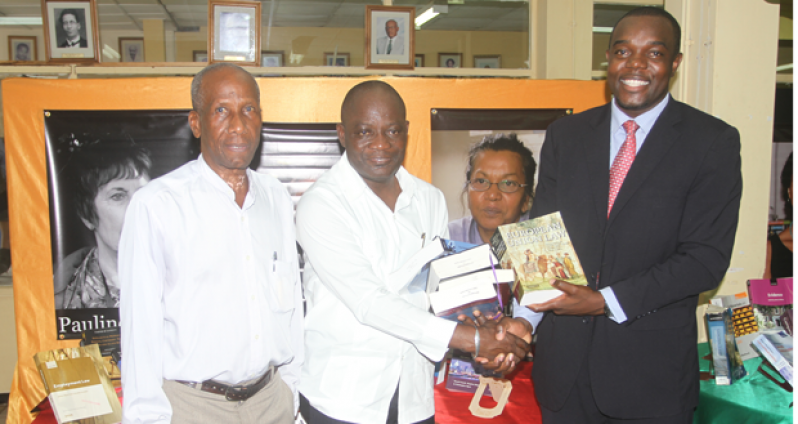The University of Guyana Law Department was yesterday the recipient of 186 law books, valued at £2,895, as a donation from the KIVO Foundation which operates out of the United Kingdom collecting out-of-edition books and distributing them to schools in the Caribbean.
This donation, intended to enhance law-related materials for students in that faculty, comprised a mixture of practitioner and academic textbooks collected from two top law schools in the UK — BPP Law School, and the College of Law. Subject matters range from International Law, Media Law, Trust Law and Company Law, among other law material.
Expressing appreciation for the donation of such invaluable resources, UG Vice-Chancellor, Professor Jacob Opadeyi, explained that while UG aims at providing the gift of knowledge, initiatives like this from the KIVO Foundation are always welcome, as they facilitate the provision of knowledge to students.
He disclosed that the price of books is one factor which puts UG in a very difficult financial position to obtain; and added that the prices of some of those books are in the prohibitive cost range of between 200 and 300US dollars.
While noting that the UG budget allows for purchase of only one or two of the books, Professor Opadeyi was confident that the books would constitute an asset to law students. “This will allow students, when they have assignments, to sit and go through these books,” he said.
Representative of the Guyana chapter of the KIVO Foundation, Mr Eusi Anderson, explained that, only a few weeks ago, he had contacted Mr. Sheldon McDonald, Head of the Department of Law at UG, to enquire if the UG Law Society would collaborate with the KIVO Foundation in order to acquire the donated books. He was pleased to announce that the donation was a product of their collaboration.
Anderson explained that the president of the London chapter of the KIVO Foundation took the decision to send to Guyana a fair mixture of books. As such, one of the books is dedicated entirely to the subject of Evidence, and is more predominantly focused on vocational training for attorneys-at-law, and not on academic training. This particular mixture of books, Anderson stressed, would enable students to familiarise themselves with vital aspects of law at an earlier stage.
Anderson also praised the students of law at the University of Guyana, explaining that they have an incredible reputation, both locally and overseas, of being able to apply the law more meaningfully in their advocacy. He therefore urged more aspiring practitioners to make use of the UG Law School and of the resources provided for them.
(By Ravin Singh)



.jpg)








